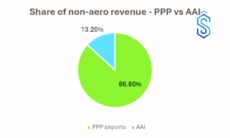Mumbai: The latest edition of the Knight Frank–NAREDCO Real Estate Sentiment Index for Q1 2025 reflects a cautious yet optimistic outlook across the Indian real estate sector.
The Current Sentiment Score registered a decline to 54 from 59 in Q4 2024, while the Future Sentiment Score also dipped slightly to 56, signaling a more conservative sentiment amid ongoing global trade tensions and macroeconomic recalibrations.
Despite the moderation, both scores remain in the optimistic zone, driven by sustained performance in commercial real estate and stability in high-ticket residential segments.
According to the Real Estate Sentiment Index report, 93% of stakeholders expect residential prices to remain stable or increase, and 67% anticipate either stability or a rise in new project launches. However, optimism around residential sales has tempered, with only 50% expecting improvement or consistency in sales performance, down significantly from 88% in Q1 2024.
The commercial real estate segment continues to show strength. In Q1 2025, 82% of stakeholders predicted office leasing volumes would either remain stable or improve, while 91% expected office rentals to hold or rise—an indication of robust occupier demand, particularly from Global Capability Centres and flex space providers.
Developers are demonstrating strategic restraint, with a noticeable decline in the Developer Future Sentiment Score to 53 from 58 in Q4 2024. Non-developer stakeholders, including banks, PE firms, and financial institutions, registered a slightly higher Future Sentiment Score of 57, reflecting a wait-and-watch approach while maintaining optimism for premium and commercial segments.
Shishir Baijal, Chairman and Managing Director of Knight Frank India, commented, “Real Estate Sentiment Index Q1 2025 represents a recalibration phase for the Indian real estate sector. While external macroeconomic headwinds have introduced caution, India’s commercial and high-end residential segments continue to demonstrate strong fundamentals.”
On the residential front, affordability concerns and demand moderation in mid and lower-income housing are contributing to the cautious outlook. Only 22% of stakeholders expect a rise in sales volumes, compared to 73% during the same period last year. Meanwhile, 28% foresee a rise in new launches, with price sentiments largely stable—50% expect a price increase versus 82% in Q1 2024.
The office sector remains the silver lining, with sustained leasing activity and healthy rental dynamics. While only 24% of stakeholders predict an increase in office supply, 41% anticipate it to remain stable—underscoring a disciplined supply approach amidst strong demand.
Commenting on the Real Estate Sentiment Index report, Hari Babu, President of NAREDCO, added, “Despite minor dips in sentiment scores, the Indian real estate sector is showing resilience. Developers are embracing a more mindful, demand-led approach. Recent RBI repo rate cuts have also improved liquidity and boosted buyer confidence, further supporting the industry’s long-term growth.”
With growing interest in Tier 2 and Tier 3 markets, increased infrastructure development, and policy support, the real estate sector remains a vital contributor to India’s economic progress.
About the Real Estate Sentiment Index:
Published quarterly by Knight Frank India and NAREDCO, the Real Estate Sentiment Index captures supply-side stakeholders’ outlook across residential, commercial, funding, and macroeconomic dimensions. A score above 50 denotes optimism, while below 50 reflects a pessimistic outlook.










